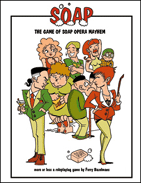
|
About OgreCave and its staff
|

|
by Cedric Chin
Name the most dangerous, deadly challenge in any roleplaying game. That's right. The other players. Each time you and your friends turn on each other, the gloves are off, and the fighting can get dirty. That's the perfect time for Soap, the RPG where you play a soap-opera stereotype fending for yourself against your fellow characters. Soap is an improvisational storytelling game, definitely in a humorous vein.
Lather. Rinse. Roleplay. So, to use an example in the book, Thorton Smith-Smythe-Smith's underlined Traits are that he is callous, mean, old, power-hungry, and rich. His Goal is to prevent his eldest son from getting his hands on his inheritance a bit early. His Secret is that he killed a man once to close a business deal. His Home set is his mansion. If you don't want to create characters, you can use pregenerated stereotype packages (templates): the Hunk, the Bitch, the Loser, the Arch-Villain, the Sweet Girl, the Mother, the Kid, and the Dilettante. (Naturally, if two players play the same stereotype, they're rivals and have an Unfriendly Relationship!) Then today's episode of Soap begins. Each player takes a turn (the rules call it a Sentence, in which he describes what's happening in the episode. In each turn, a player includes Where the action is and What is going on. The Sentence typically involves your character, but this is optional -- and it's often more fun to "meddle in other characters affairs"! Plot Tokens are used to Contest a Sentence. If a player doesn't like another player's sentence ("Michael accidentally runs a red light and plows into a cement truck. 'Aaaaaaarghhh!!!'"), he can Contest it. The player who formed the Sentence bids at least one Plot Token, and any player can enter a bidding contest with him. Ties go to the contesting player(s). Whoever wins the bid spends the Plot Tokens he bid, and alters the sentence. It's a simple easy mechanic -- and if a munchkin player tries to accumulate too many Plot Tokens, it's time to meddle with his character! Every time a player refers to one of his Traits during his turn, he receives a Plot Token. Every time a player says a sentence which includes one of his Secret words, he receives three Plot Tokens. (We added a rule that you could not re-use a secret word for tokens until you used each Secret word at least once.) Every time a player reinforces one of his relationships, he receives a Plot Token. And, as said, each player starts with two Plot Tokens. If a player attains his Goal, he receives two Plot Tokens. At the end of a turn, you may guess another player's Secret. If successful, you receive five Plot Tokens. Additionally, the character is eligible to be killed (now that his Secret is revealed, the show's viewers are no longer interested in him!). As an example, again from the book, Silvia begins play with her turn: "Michael and Charlotte's apartment in uptown New York. The walls are adorned with priceless paintings and Ming vases decorate the corners of the living room. Charlotte sits down on the couch in the apartment. God I hate that bastard... She sighs." Silvia's Home set is her apartment, so she receives a Plot Token. Her Unfriendly Relationship is Michael, so she receives another Plot Token. One of her Traits is rich, so she receives a third Plot Token. Players continue taking turns until ninety minutes, or whatever time limit agreed upon, is reached. The active player then ends his Sentence and leaves the episode on a cliffhanger. Rules are also included for campaigns (Serial Games). Much like roleplaying, there is no winner, and the play is what's important. Players continue taking turns until ninety minutes, or whatever time limit agreed upon, is reached. The active player then ends his Sentence and leaves the episode on a cliffhanger. (Rules are included for campaigns, aka. Serial Games.) Much like roleplaying, there is no winner, and the play is what's important.
Comments My only wish is that either the book or website had pregenerated stereotypes for other "soapy" genres: anime, comic books, Victorian court intrigue, that sort of thing. While us rpg players enjoy character generation, pregenerated stereotypes would be useful for newbie rpg players. Some added planning in the layout stages could've helped Soap a bit. The pregenerated characters in the book are presented in the traditional two-column text layout. Thus, some pregenerated characters started in the lower half of first column, and ended in the upper half of the second. I would have preferred a pregenerated characters to be presented as, say, ready-to-photocopy character sheets. The game is also available as a PDF for $2.95. I don't have any problems recommending this storytelling game. I've played Paranoia, I've played Baron Munchausen, and Soap is sort of a cross between the two. It's fun, it's creative, it's treachery. Lights, camera, backstabbing!
|
||
 Soap: The Game of Soap Opera Mayhem
Soap: The Game of Soap Opera Mayhem